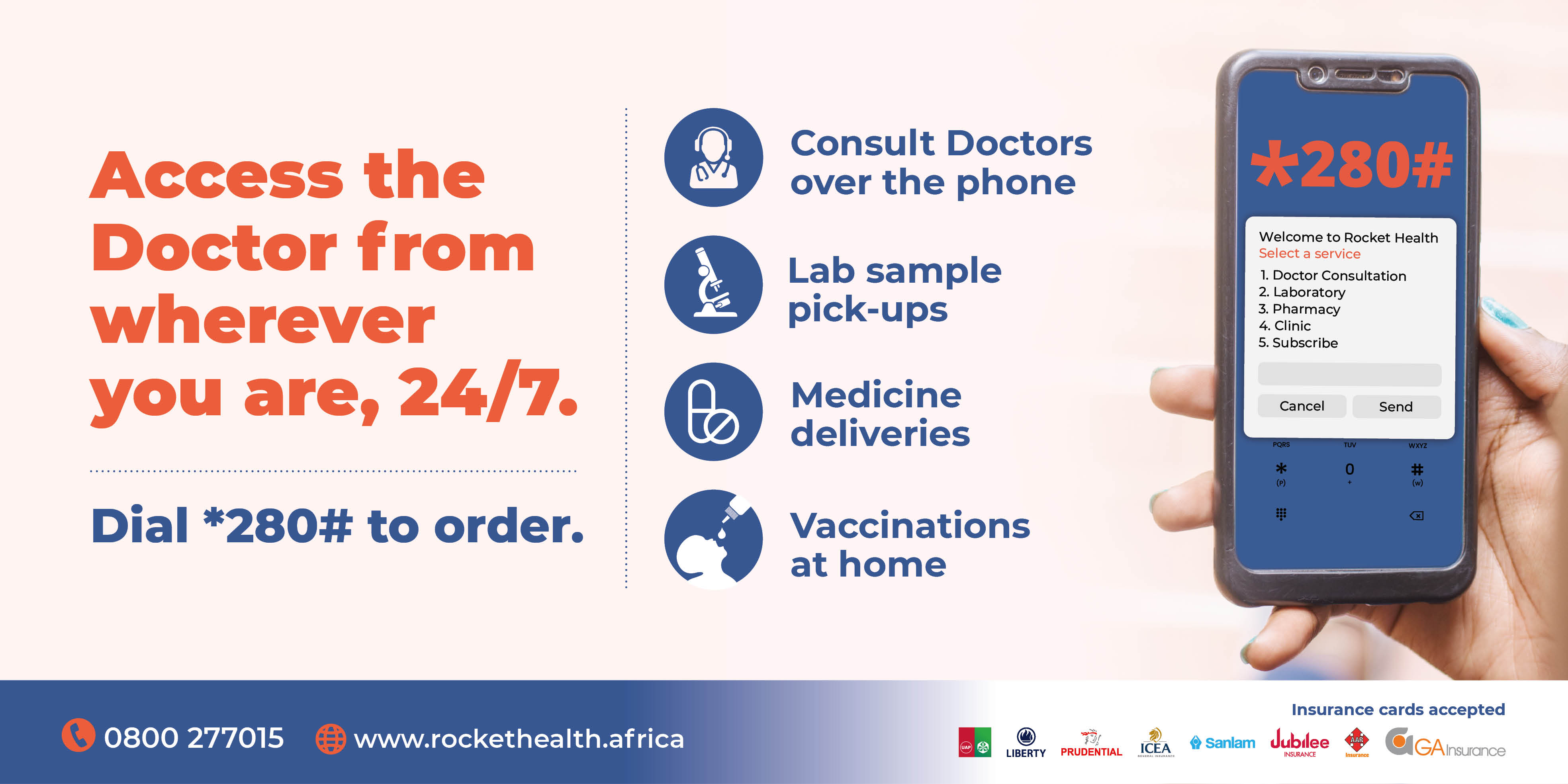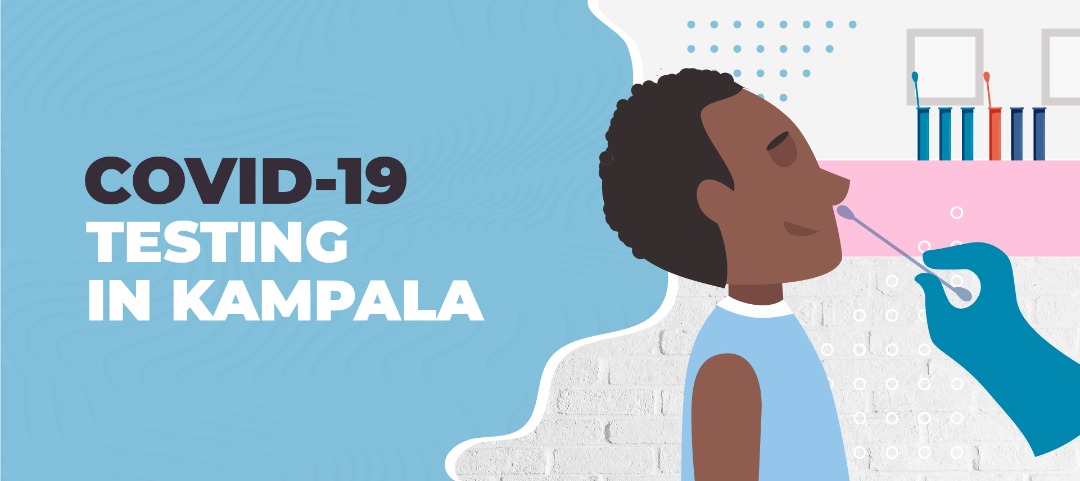Written by Ernest Jjingo
May 5, 2021
Eight years ago, five young medical entrepreneurs introduced the telemedicine concept in Uganda. Dubbed Rocket Health, the venture was met with some scepticism from some funders and stakeholders but its strategy to bring to people’s doorsteps is narrowing the gap between doctor and patient. As Ernest Jjingo writes, telemedicine could be a much-awaited innovation in the healthcare sector.
DEVELOPING THE IDEA
Dr Davis Musinguzi, the founder and managing director of The Medical Concierge Group (TMGG)/Rocket Health which undertakes telemedicine services, says telemedicine involves the use of information, communication technologies and smart medical devices to deliver healthcare to patients at a remote location.
He says the idea came about after realizing that Uganda at the moment has a doctor-to-patient ratio of 1:25,000 and it became pertinent for them to introduce innovative ways to increase access.
“We introduced telemedicine in Uganda to transform how healthcare is delivered; we saw the need for accessible, quality and affordable healthcare everywhere around us and across all socio-economic classes.”
Musinguzi adds that for the last eight years of their existence, telemedicine has shown to reduce and prevent unnecessary visits to the clinic, number of hospitalizations, hospital readmissions, length of hospital lines, duration of consultations, and number of laboratory tests.
“Our main objective was to improve healthcare in Africa and ensure that the ever-increasing population receives and enjoys quality healthcare at their convenience. Telemedicine holds a great promise for improving global access to healthcare and informatics, particularly in the developing world,” he said.
WHO THEY ARE
Dr Musinguzi, however, did not do this alone; he was helped by a team of four other professionals in different fields who included Dr John Mark Bwanika who holds a bachelor’s degree in Medicine and Surgery from Makerere University and is a Google e-Health scholar.
His experience spans clinical research in infectious diseases, health innovations and neuroscience. Another one is Dr William Lubega who holds a bachelor’s in Medicine and a master’s in Plastic Surgery and Computer Science.
His experience spans global health and surgery, technology, social and health innovations. The third one, Hope Achiro, is a pharmacist with a master’s in Operations and Supply Chain Management from the University of Manchester and serves as a member of the governing council at the Pharmaceutical Society of Uganda. She brings extensive experience in health systems strengthening, supply chain management and governance.
The fourth is Fiona Nuwamanya, who is a chartered certified accountant (ACCA), holds a Bachelor of Science in Statistics and an MBA. She brings industry experience in driving key structural changes in finance, human resources, business processes across the medical, financial and NGO sectors.
Dr Musinguzi himself holds a bachelor’s in Medicine and Surgery and an MBA in Healthcare Management, with experience in conducting and overseeing digital health programs with government, development agencies and several private organizations.
They also employ a team of about 80 people which comprises several medical practitioners such as doctors, pharmacists, laboratory technicians, clinical officers and nurses. Others are software developers, administrators, marketing and communications experts, and practitioners in finance or human resource, to mention but a few.
HOW IT IS DONE
The customer journey starts when one uses their mobile devices to reach out to the doctors for a consultation. There is a 24-hour medical call centre staffed with licensed medical doctors that can be reached through a toll-free line, WhatsApp social media or the website. Through these channels, patients can access the doctors from wherever they are in the country or around the world.
When a diagnosis is done and a prescription given, delivery is made to the client if they are around Kampala and some areas of Mukono and Wakiso districts. The same applies to laboratory services: a technician will come to you to collect a laboratory sample, run the tests within the laboratory and have the doctors communicate the results to you and share them electronically.
If you are in other parts of the country where they are unable to give you the service, they have a referral database of pharmacies, laboratories or public health facilities where you can get the services. The doctors continue to follow up with all patients to ensure that they get quality clinical outcomes.
When it comes to patients’ safety, Dr Bwanika said since a patient’s safety is key is in the business of healthcare delivery, they have terms and conditions especially for those ordering via the online shop.
“One must agree that they are eligible to order products such as condoms before we even attempt to deliver. For medication that requires a prescription, clients are requested to share the prescription electronically via email or WhatsApp or present it to the pharmacy technician upon delivery,” he said.
For patient data security, there is a dedicated team to provide high-tech security for all the patient information.
RECEPTION
Dr Bwanika said there has been great reception so far especially with the medical insurance companies where they have been able to partner with six insurers to ease the burden of the doctor-to-patient ratio and quick access to convenient healthcare for all their clients. Covid-19 also affected the way medical organizations and traditional hospitals operated, by forcing them to engage with their patients through remote care.
He, however, said that if telemedicine services are to be promoted in the country, the government and stakeholders should be keen to raise awareness about the benefits of remote patient care and work more closely with telemedicine service providers to promote the service around the country as this will make it easy for people especially in remote areas to have easy access to quality healthcare.
CHALLENGES
Just like any other venture, developing the telemedicine service was met with some challenges which Dr Musinguzi and his team had to endure like the e-health policy in Uganda which is not fully operational or contextually relevant to e-health products, services and telemedicine operations.
He said the TMCG telehealth practitioners have had to develop internal standard operating procedures (SOPs) and adopt international telehealth standards. “TMCG’s internal policies include the Clinical Management Policy, the Research Policy, and SOPs for managing interactions across e-health platforms,” he said, adding that the transition and adaptability of people to change from traditional ways of healthcare to digital have also been slow and it is still a work in progress.
Dr Lubega said the telemedicine service has the risk of a high turnaround time which is mainly due to the increase in traffic and some areas having weak internet connectivity that often affects the billing process and prolongs interaction time.
To mitigate these challenges, they have gotten into partnerships with Safe Boda and Jumia to scale up pharmacy and laboratory services deliveries. Very soon, they shall also be introducing a USSD code to allow clients with no internet connectivity continue to access medical care whenever they need it.
ABOUT ROCKET HEALTH
Rocket Health is a bundled service of The Medical Concierge Group, including a licensed and registered clinic, laboratory and pharmacy. It has empowered Ugandans to make use of their mobile devices to get quality medical attention without leaving their homes.
“We have seen an increase in the number of people accessing the service remotely and this can be attributed to two major areas. Firstly, the pandemic made people more aware of telemedicine services because of the limited movement and, secondly, our partnerships with different insurance providers allow individuals to access Rocket Health telemedicine services under their insurer,” Musinguzi said.
The long-term goal and vision of Rocket Health are to be the leading world-class digital health company in Africa. “Throughout the pandemic period, telemedicine has proven to be the future of healthcare. The Covid-19 pandemic has shown us that everything that we can routinely access physically, we should be able to access virtually.”
Dr Lubega projected that they will see more traditional healthcare service providers, government and international agencies adopting telemedicine and together, provide quality and affordable healthcare services further into the rural communities.


